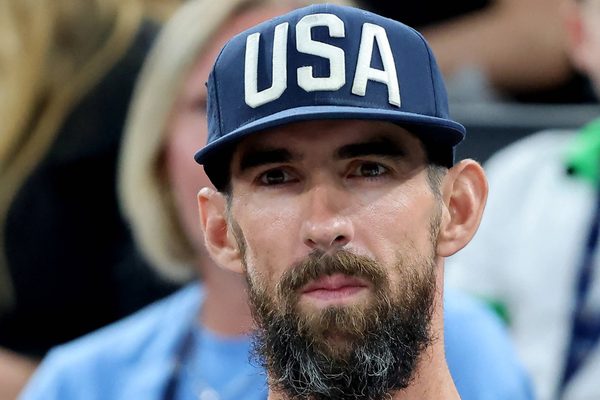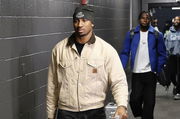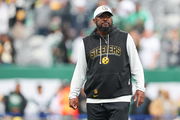
Imago
Imago

Imago
Imago
The loudest voices in American swimming today do not come from the pool but from two of its most decorated champions. Michael Phelps and Ryan Lochte turned a struggling World Championships into a public reckoning, with Lochte staging a mock “funeral” for USA Swimming on social media and Phelps declaring, “Call it a funeral, or call it a fresh start.” The criticism has ignited heated debate, but behind the spectacle lies a strikingly personal confession. For all the glory they achieved in their sport, both Phelps and, earlier, Simone Biles have admitted they would hesitate to let their own children follow in their footsteps.
Watch What’s Trending Now!
The conversation surrounding USA Swimming’s decline has sharpened since Paris. In 2016, the United States captured 57 percent of medals available in Rio. Eight years later in Paris, that number fell to 44 percent, the lowest since 1988. Phelps has not blamed the athletes. Instead, he has leveled charges at “poor operational controls and weak leadership” within the governing body. His criticism has not gone unanswered, but it has also resonated with many inside the sport who feel the system is eroding. “While I’ve faced some pushback,” Phelps wrote in his most recent statement, “most of the feedback I’ve heard echoes my feelings about the challenges facing USA Swimming today.”
That statement contained the line that cut deepest: “As a Dad to four young boys, it pains me to say that I’m not sure if I’d want my sons to be a part of this sport at a competitive level.” For Phelps, swimming delivered triumphs nothing else has matched, yet he described a career where his voice “went unheard” and his frustrations were dismissed. He believes the system is broken, in need of “accountability,” “transparency,” and a new commitment to athletes. His concern is not whether medals can still be won, but whether the environment fosters health and dignity for the people who earn them.
ADVERTISEMENT
View this post on Instagram
Simone Biles reached a similar conclusion four years earlier, though in a different context. Speaking to 60 Minutes in 2021, she said she “wouldn’t feel comfortable” putting her daughter in gymnastics. Her reasoning was blunt: “They haven’t taken accountability for their actions and what they’ve done. And they haven’t ensured us that it’s never going to happen again.”
As a survivor of abuse under former team doctor Larry Nassar, Biles has pressed for an independent investigation and sustained reform. She has also described the grim conditions at the Karolyi Ranch, where young gymnasts were so underfed that they broke into the cafeteria at night. To her, those experiences showed “it’s not the right training.”
ADVERTISEMENT
Taken together, the comments from Biles and Phelps are not simple rebukes. They are warnings from two of the most accomplished athletes in American history that the systems which built them also inflicted harm. Both have said the sports they mastered must change before they would encourage their children to compete at the highest level.
Their words arrive at a moment when U.S. programs are not only fighting for medals but for trust. Whether leaders in swimming and gymnastics take this reckoning seriously will shape not only the next Olympics but the willingness of future generations to step onto the starting blocks or the beam.
ADVERTISEMENT
Michael Phelps and Simone Biles’ Critique of Broken Systems Leaves Fans Concerned
Michael Phelps’ latest critique of USA Swimming has struck a nerve well beyond elite competition. The sport’s most decorated Olympian’s call for accountability echoed concerns already voiced by parents at the grassroots. One parent wrote, “Who better to address these issues? I am at the point that I have to choose which child can stay swimming due to cost. This is so heartbreaking as my son is going to be devastated that I cannot afford to pay for both kids.”
The struggles extend far beyond medals. The same parent explained that “only the wealthy can afford the brand new tech suits and apparel,” while swimmers miss camps and competitions because “we just can’t afford both kids.” When combined with Phelps’ warning and Simone Biles’ 2021 statement that she “wouldn’t feel comfortable” putting her daughter in gymnastics, the message is clear. That the American system risks losing not just champions, but families, unless reform comes soon.
ADVERTISEMENT

Imago
Credits: IMAGO
Phelps’ decision to publicly confront USA Swimming’s leadership struck a chord with peers who value his courage. Rowdy Gaines captured this, writing, “So proud to call you my friend. Love ya bro. Well said! Thank you for speaking up for our sport!!” His words show how Phelps’ critique isn’t seen as disloyalty but as a defense of athletes, validating the need for accountability and athlete-centered reform.
Top Stories
Frustrated Aaron Rodgers Clears Retirement Stance, Addresses Absence From Steelers Final Drive vs. Texans

Cowboys’ Rookie Sensation Donovan Ezeiruaku Arrested on Reckless Driving Charge

Chiefs Officially Cut Ties With 7 Players as Patrick Mahomes Pays the Price for Offensive Failures

Jerry Jones Announces Retirement Plans as Dallas Cowboys Owner Makes Triple Decision on Coaching Hiring

Mike Tomlin Announces Stance on Steelers Exit, Confirms Reason for Ditching Aaron Rodgers & Cam Heyward

Jordan Spieth Intervenes as Brooks Koepka Upsets PGA Tour Pros With ‘Return’ Announcement

The recognition of Phelps as the sport’s ultimate authority reflects how deeply his voice matters in shaping change. One reaction stressed, “The greatest swimmer of all time should absolutely be the leader of USA swimming.” With medals unmatched and credibility rooted in lived experience, fans believe Phelps’ leadership could restore trust and transparency, turning criticism into a roadmap for rebuilding the program.
ADVERTISEMENT
Concerns about structural inequities resonate with Phelps’ larger critique of a “broken system.” A fan noted, “In my area the LSC and USA swimming are focusing on the big teams and if you are a little team because that’s what your parents can afford than it’s difficult to compete…” This points to financial and organizational favoritism that leaves smaller clubs behind, highlighting how systemic imbalances weaken the grassroots foundation of American swimming.
Declining infrastructure and volunteer shortages illustrate how operational gaps erode the sport’s accessibility. One parent observed, “My husband is both a USA swimming and high school swimming official- it feels like they struggle to find officials for almost every single swim meet…” This struggle mirrors Michael Phelps’ critique of weak operational controls, showing how insufficient support at local levels, whether in staffing or pool availability, directly undermines opportunities for the next generation.
ADVERTISEMENT
ADVERTISEMENT
ADVERTISEMENT

